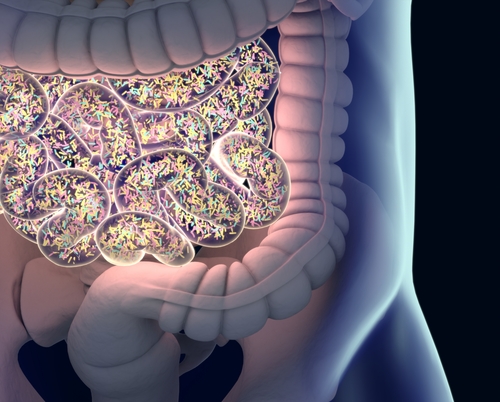Protein Produced by Common Gut Bacteria Can Trigger Autoimmunity, Study Suggests
Written by |

Bacteria that reside in human gut may trigger autoimmune reactions by producing human-like proteins that mimic a naturally occurring and crucial cell protein.
Researchers at Queen’s University Belfast in Ireland report that patients with autoimmune disorders — such as multiple sclerosis (MS), rheumatoid arthritis, and ulcerative colitis — have higher-than-normal levels of a “mimic protein” produced by Bacteroides fragilis – a member of the gut microbiome in people.
This protein has the potential to activate the immune system to attack not only the bacteria-produced protein, but also the natural protein by mistake, contributing to autoimmune deregulation.
The finding was reported in the study “Antigenic mimicry of ubiquitin by the gut bacterium Bacteroides fragilis: a potential link with autoimmune disease,” published in the journal Clinical and Experimental Immunology.
Several studies in recent years have demonstrated that gut resident bacteria play an important role in regulating the immune system and its responses. Some suggest that the gut microbiome can work to protect against MS, while others report that gut bacteria can actually contribute to disease progression.
Despite the contradictory results, these studies inspired work to better understand the underlying mechanisms of autoimmunity, and to potentially develop strategies to treat serious autoimmune disorders such as MS.
Discuss the latest research in the MS News Today forums!
The Belfast researchers found another possible culprit for immune system deregulation and induced autoimmunity, the common gut bacteria Bacteroides fragilis. These bacteria were found to produce a protein called BfUbb that is 63% identical to the naturally produced ubiquitin protein, which is central to cell processes.
“When we mapped the genome of Bacteroides fragilis a few years ago we were astonished to discover a human-like gene not present in any other bacteria. The protein produced from this gene is nearly the same shape as a protein in almost every human cell,” Sheila Patrick, PhD, a professor at Queen’s University and the study’s senior author, said in a university news release.
“When we discovered that Bacteroides fragilis produces lots of this mimic protein we were very excited. No other bacteria produced a mimic of human ubiquitin and this one lives in our gut. We immediately wondered if it might be linked with autoimmune diseases,” Patrick added.
Ubiquitin is present in almost every human cell, and is essential for normal protein processing and transport, as well as efficient inter-cell communication and gene readout. The absence of ubiquitin can severely disrupt the workings of cells.
To better understand the potential role of BfUbb in autoimmune diseases, the team investigated its levels in blood samples collected from patients with such diseases as systemic lupus erythematosus, ulcerative colitis, rheumatoid arthritis, celiac disease, and MS.
They found that, compared to healthy volunteers, patients who were positive for autoantibodies, including anti-nuclear antibodies (ANAs), were also more likely to be positive for antibodies targeting the BfUbb protein.
In addition, the team found that the antibodies which recognized the BfUbb protein could also effectively identify and bind to ubiquitin. This confirmed that these two proteins have similar sequences and structures, which may lead the immune system to wrongly recognize both as potentially damaging signals and launch attacks.
“We have found that some people with autoimmune disease have high levels of antibodies to the bacterial mimic of ubiquitin. It is also possible to have antibodies to both the human and the bacterial mimic,” said Linda Stewart, a lecturer at the School of Biological Sciences and Institute for Global Food Security at Queen’s University, and lead author of the study.
The researchers are planning to further explore the role of this “mimic protein” in disease progression, by studying the relationship between disease stages and antibody levels in individual patients.
Based on these findings, they hope to develop a blood test to easily detect BfUbb-targeted antibodies so as to potentially identify people at risk of developing an autoimmune disease.
“We now need to work out if the mimic of ubiquitin sets up the mistaken immune response. We may then be able diagnose some autoimmune diseases early and eventually be able to prevent some of them from happening,” Stewart said.





